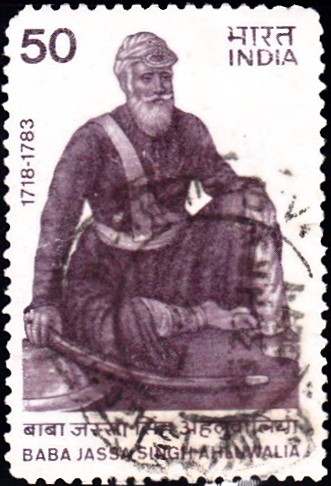
Baba Jassa Singh Ahluwalia
A commemorative postage stamp on the Death Bicentenary of the “Bandi Chhor“ Jassa Singh Kalal, an Indian Sikh leader of Sikh Confederacy, founder of Kapurthala State :
 Issued by India
Issued by India
Issued on Apr 4, 1985
Issued for : The Indian Department of Posts is privileged to issue a commemorative stamp on this leading spiritual leader and warrior.
Description of Designs : The stamp and First Day Cover have been designed by India Security Press, Nasik. The cancellation has been designed by Nenu Bagga.
Type : Stamp, Postal Used
Colour : Plum
Denomination : 50 Paise
Overall size : 4.06 x 2.73 cms.
Printing size : 3.71 x 2.38 cms.
Perforation : 13 x 13
Paper : Unwatermarked P. G. Matt coated paper
Number printed : 15,00,000
Number per issue sheet : 40
Printing process : Photogravure
Printed at : India Security Press
Name : Sultan ul Quam Nawab Jassa Singh Ahluwalia
Born on May 3, 1718 at Ahlu, Lahore District, Punjab, India [now Pakistan]
Died on 1783 at Amritsar, Punjab, India
About :
- Baba Jassa Singh, the elected supreme commander of the Sikh Federation or ‘Misls‘, during the struggle of Sikh people for freedom, was born on May 3, 1718, in a small village Ahlu, near Lahore, now in Pakistan. His father, Sardar Badr Singh died when he was just five. His mother, a noble lady of deep religious convictions, brought him up with the help of her brother Sardar Bagh Singh. They took young Jassa Singh to Delhi in 1723 to seek the blessings of Guru Gobind Singh‘s spouse, Mata Sundarji, who lived in Delhi at that time.
- Mata Sundarji looked after Jassa Singh as her own child. He soon developed into a promising youth, well-versed in Persian and Arabic and became proficient and adept in the use of arms.
- It was under the guidance of the great leader of the Sikhs of the age, Nawab Kapur Singh Faizullahpuria (who adopted him as his son) that Jassa Singh got his early training in the art of warfare and state-craft. After the death of Nawab Kapur Singh in 1753 he was acclaimed as the national leader of the Panth and was hailed as the ‘Padishah‘ or ‘Sultan-ul-Qaum‘ of the Sikhs after their conquest of Lahore in November 1761.
- Some contemporary writers have described the personal appearance of the Sardar in glowing terms. According to them he was a tall, fair-complexioned, muscular man with a long flowing beard and like the great Arjuna (also known as ‘mahabahu‘ – the long-armed one) he had extraordinarily long arms reaching upto his knees. He wore a simple white dress, carrying heavy armour.
- He was not only a great warrior and hero, but was also regarded as the spiritual leader of the Sikhs. He was responsible for preserving and consolidating the Sikh religious tradition amidst their struggle for existence. He restored the holy Durbar Sahib (the present holy Golden Temple) to its pristine glory and splendour after wanton attacks on it by Ahmed Shah Abdali. To Sri Durbar Sahib he donated a sum of nine lakhs personally in addition to another five lakhs collected from brother Sardars for the construction work. This act is recorded in Sikh history as ‘Guru ki Chaddar’. In recognition of his great services to Dharma he has also been called ‘Dharamvir’ (Defender of Faith).
- The struggle of Sikhs under Baba Jassa Singh Ahluwalia was not for any narrow objectives or for capturing personal power. The fight was waged against frequent foreign invasions and tyrannical rule of the Mughals. The great heroes of the Punjab right from the days of Porus and Jaipal, down to this period were fighting as much for the defence of the country as for the protection of their hearths and homes, their religion and culture. If invaders like Alexander, Nadir Shah and Ahmed Shah Abdali could not proceed far beyond Beas or the Yamuna, it was due mainly to the fierce resistance put up by these brave warriors.
- Baba Jassa Singh passed away in 1783. As a rare gesture of the recognition of his services to the Panth, his mortal remains were cremated in the holy precincts of Burj Baba Atal Sahib, Amritsar, where his ‘Samadhi’ exists to this day.
- Text Courtesy : Baba Jassa Singh Ahluwalia Centenary Committee, New Delhi.


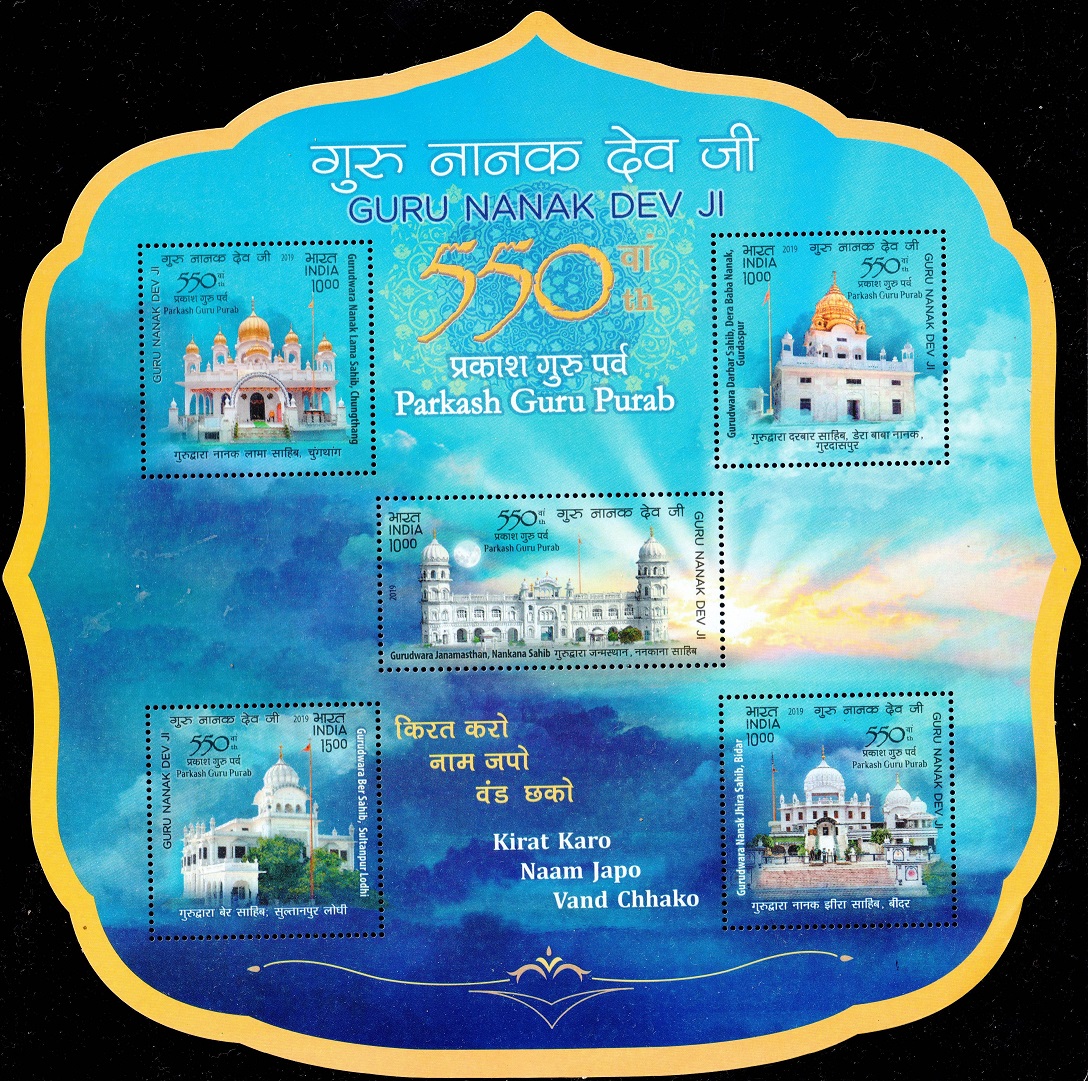

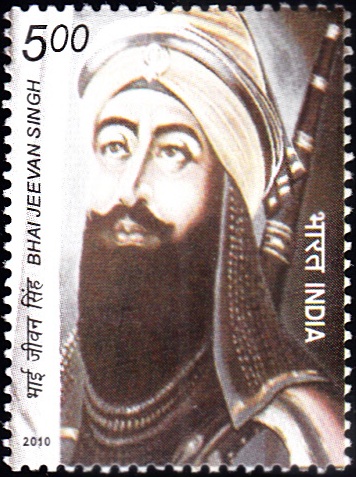
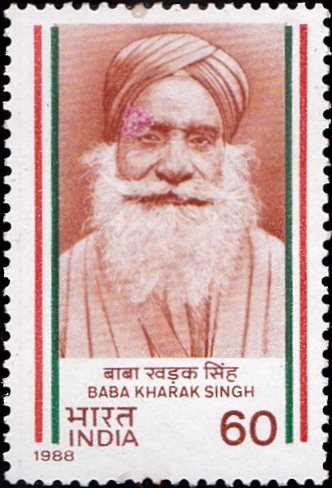

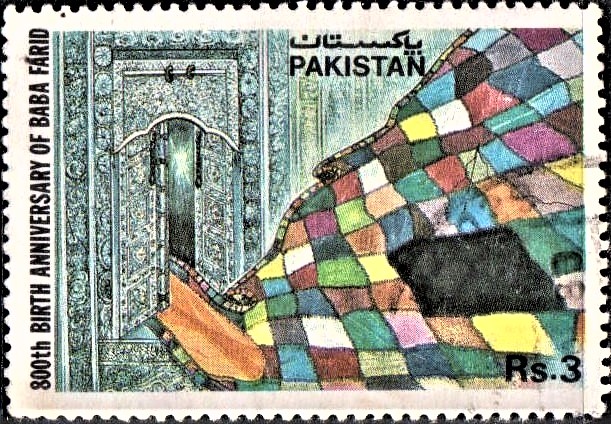
A good act for indian Govt. For publishing commemorative stamps on warriors. Thanx